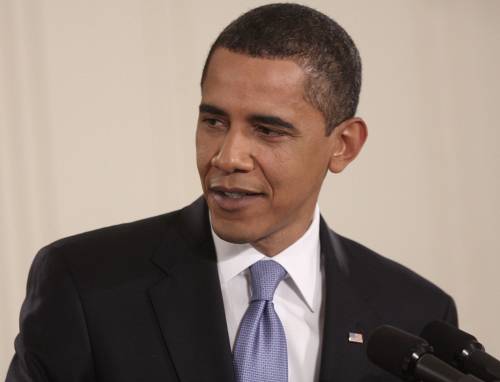Obama Heads to Hill to Talk Immigration Reform
Sen. Charles Schumer says there are enough votes in the Senate to pass an immigration bill.
Jul 31, 2020244.8K Shares3.2M Views
President Barack Obama (WDCpix)
Advocates for comprehensive immigration reform have high hopes for President Obama’s meeting scheduled for Thursday afternoon with Congressional leaders on the issue, but it’s not clear that a bill will even be proposed this year.
At a National Hispanic Prayer Breakfastlast week, President Obama won applause when he promised Latino religious leaders that he’s “committed to passing comprehensive immigration reform.” But on Monday, White House spokesman Robert Gibbs signalled that movement on immigration was not likelyanytime soon. Despite “the president’s desire for it to happen,” said Gibbs,“currently where we sit the math makes that real difficult.”
Illustration by: Matt Mahurin
Congressional leaders don’t necessarily agree. On Tuesday, Senate Majority leader Harry Reid (D-Nev.) said he believes he does have the votes in Congress to support comprehensive immigration reform this year.
Advocates, meanwhile, who’ve worked hard to form a broad-based coalition of religious, ethnic, labor and civil rights groups around the issue, complete with its own website, ReformImmigrationForAmerica.org, are eager to keep immigration reform on the president’s agenda.
“We see this as a critical moment of truth on immigration,” said Jaime Soto, the bishop of Sacramento, who participated in a conference call with reporters on Wednesday set up by the National Immigration Forum. “Tomorrow’s meeting will tell us whether the administration is serious about enacting immigration reform this year, or getting timid.”
For Soto and his colleagues, immigration reform means a package of measure that both ease enforcement of current immigration restrictions and provides a path to legalization for many of the 11 million or so undocumented immigrants that live in the United States already.
Signaling his support for the idea, Sen. Charles Schumer (D-NY), chairman of the immigration subcommittee, at a conference at Georgetown University on Wednesday announced seven key principles to guide immigration reform. Those include a statement that “illegal immigration is wrong” and must be dramatically curtailed; the United States needs to better control its borders through improved technology, infrastructure and more border agents; a reliable employer verification system to keep employers from hiring illegal immigrants; registration by all illegal immigrants in the United States to qualify for a path to citizenship; family reunification; encouragement of “the world’s best and brightest individuals” to come to the U.S.; and a more “controlled flow” of unskilled workers who can contribute to the economy.
“When the President asks me whether we can pass comprehensive immigration reform this Congress, I will smile and say, ‘Mr. President, yes we can.,’ ” Schumer told the group gathered at Georgetown, organized by the Migration Policy Institute. “All of the fundamental building blocks are in place to pass comprehensive immigration reform this session and, even possibly, later this year.’
Schumer did not acknowledge the contradictory statement by Gibbs earlier this week. But in setting out broad principles, Schumer tried to navigate carefully among the many constituencies interested in immigration reform, from Latino and civil rights groups to labor organizations and business interests, all of which emphasize different principles differently.
“He really focused on the fact that credible enforcement has to be a big part of this,” said Michele Waslin, Senior Policy Analyst at the Immigration Policy Center, who attended the conference at Georgetown. “They need to admit that illegal immigration is wrong. I think that in his seven principles he really touched on all the key elements,” she said. “I’m sure he pleased a lot of constituencies.”
Still, on the National Immigration Forum’s conference call yesterday, it was clear that the tension between labor organizations’ support for legalization of immigrants, which would potentially create more union members, and business groups’ interest in a temporary guest-worker program remains to be resolved.
Tamar Jacoby, president of Immigrationworks USA, a national federation of employers concerned about immigration law, said that employers are as interested in immigration reform as immigrants’ advocates. “It’s absolutely essential to employers who rely on immigration that there be a way for workers to enter the country legally,” she said. “That’s not negotiable from a business point of view.” Employers are advocating for a commission that would make the number of temporary work visas available responsive to market conditions, she said.
But Mark Lauritsen, Vice President of the United Food and Commercial Workers Union, said his union opposes any “guest worker schemes.” “Any bill that comes through with these guest worker schemes is not going to work,” he said. “It’s going to create a problem. If anyone is good enough to come into this country and get a job, then they’re good enough to participate in all aspects,” he said. “It’s going to fall on its face to say we need workers but we’re going to use you up, burn you up, get rid of you in a year.” Although he was open to the idea of a commission, it should be to determine full immigration rights, not temporary work status, he said.
Still, Jacoby was eager to suggest that compromise was possible. “This is not an easy issue, many different constituencies have a stake in this,” she said. “The job of politics is to negotiate an agreement where everybody gets enough. That’s what we’re all anticipating the president is kicking off.”
The recently proposed Agricultural Job Opportunities and Benefits Act, known as AgJobs, introduced in Congress attempts to forge just such a compromise, making it easier for employers to show they need to hire foreign labor for farmwork, and providing some of those workers a path to legalization and citizenship. Other pending immigration bills, such as the DREAM Act, address the humanitarian side of immigration reform, and would provide some children of undocumented aliens who’ve been raised in the United States with a path to citizenship.
Advocates for immigration reform appear so far to have convinced members of Congressnot to put those bills up for a vote separately, but to make them part of a larger comprehensive package that would please a broad range of constituencies.
Still, there are some vocal hard-line restrictionist immigration groups who disapprove of all attempts at a comprehensive immigration reform that includes legalization for undocumented immigrants — what they call “amnesty” for illegal aliens. They’ve been lobbying Congress hard against it, portraying immigrants as eager and ready to snatch up scarce American jobs.
“I don’t see it as a kick-off,” said Roy Beck, executive director of Numbers USA, which advocates restricting immigration, referring to the president’s meeting with congressional leaders on Thursday. “I think the fact that they’re bringing in a number of members of Congress who will be defiantly against a comprehensive immigration bill suggests that the purpose of this meeting is more to lay out the broad spectrum that’s there in Congress and show how difficult it will be to put together a majority to pass a bill,” he said. In addition to to the conflict over guest workers, he noted that Schumer, for example, supports a national identification card, while civil liberties groups such as the ACLU oppose that. “It seems the president is giving himself some cover to hold back a little from the Hispanic caucus,” said Beck. “They’re the only members of congress keeping this thing alive.”
Beck emphasized that the last time a comprehensive immigration reform bill including “amnesty” was proposed in Congress with the support of President George W. Bush, it didn’t pass. “Why would members who voted against it in 07 when the economy was strong vote for it now?” he asked.
Advocates of immigration reform hope that this time, members of Congress will be able to come up with a better compromise, and that Obama will lend his own powers of persuasion to the effort. “Reid said he’s committed to moving on immigration reform, the votes are there, and the real challenge is to find the floor time,” said Frank Sharry, executive director of America’s Voice, an immigration reform advocacy group. “We’ve been working on this issue for a very long time. There’s no question there are solid majorities in both the House and Senate that are easily imagined for the bill to be enacted. The question is, are we going to have sufficient presidential leadership, are we going to have democrats propose legislation,” and “are there going to be republicans who are willing to stand up and cooperate with the White House to get this done?”
Although advocates don’t expect any specific commitments from members of Congress or President Obama on Thursday, Sharry say they’re hoping for at least a “road map” of next steps on moving immigration reform forward: “who’s going to do what to make those steps happen will be very important.”

Rhyley Carney
Reviewer
Latest Articles
Popular Articles

